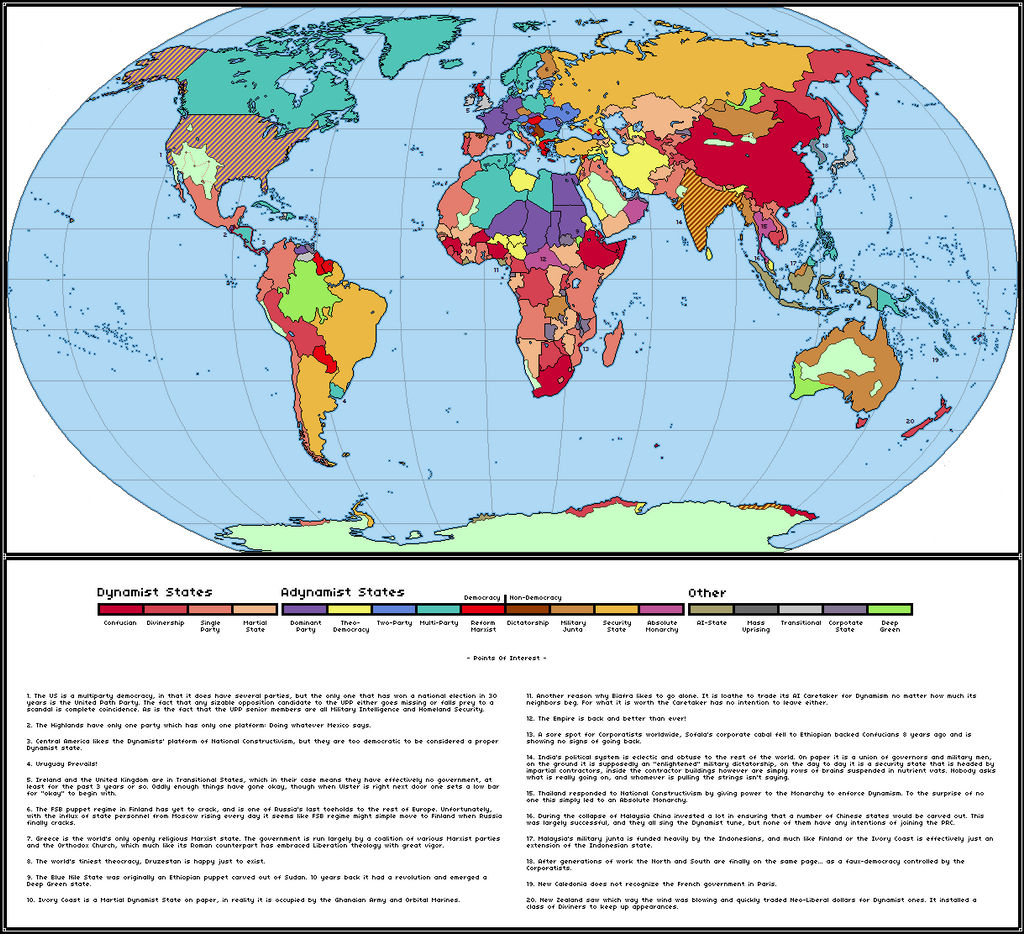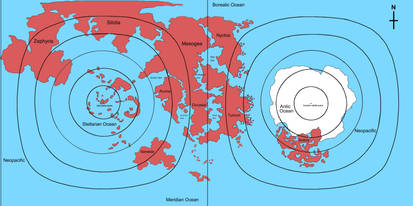Deviation Actions
Description
The year is 2150 and democracy is dying. Far fallen from its height in the late 20th century the ideals of democracy and neoliberalism have given way to a new zeitgeist. The rise of China, and later on the rise of much of the Global South made the triumphalism of open markets, democratic trappings to please the West, and a hundred years of globalist philosophy obsolete to billions of people. In its wake came a backlash against globalization, a return to romanticism and traditionalism, and for a while a spring of renewed fascism across the world.
The end of this global reactionary movement came not from a renewed push by liberal democracy, or any sort of alliance springing from the West, but by way of another reaction to globalism and embrace of traditionalism: Dynamism.
What is Dynamism?
Dynamism is a political philosophy revolving around the “Dynamic state”, or essentially a state that maintains a balance between global commitments and national identity. In reaction to anti-globalism, Dynamism rose to argue that only through a globalized system of states working to preserve each others’ culture and respecting the state as the vanguard of culture, can tradition and identity be preserved. Descended from the Constructivist school (and as a result was sometimes called National Constructivism, especially in its earlier years), which advocates that international relations and states are socially constructed rather than inherent, Dynamism rejects the idea that states must naturally compete in accordance to game theory (as in Neoliberalism) or be antagonistic towards each other because of force politics (as in Neorealism). Instead, as social constructions it is in the interest of the state to protect the culture that spawned it, and is in its best interest to ensure that other states do not harm its culture. The result of this line of thought was that instead of nationalist and fascist warmongering over culture, that nationalisms must naturally cooperate so that they neither destroy each other nor destroy themselves. This cooperation however requires globalism to work, thus globalism must not be rejected but instead molded to support regionalism and nationalism. Finally, for a state to protect its culture efficiently it cannot be democratic, at least not completely, as the duty of the state is to the general culture rather than the inclinations of individual citizens, so democracy must be curbed (or at least reduced) as any democratic state would become too bogged down in partisan issues to sustain itself.
These basic ideas, that states emerge from culture, that states must be the vanguards of their cultures, that states must support each other, that democracy hampers the state, and that nationalism depends upon globalism are all that the Dynamists agree on. When it comes to how exactly this should be done, the agreement ends.
There is, indeed, a Dynamist International, which is ostensibly united, but beyond this Dynamist splits off into various different ideologies, the four main ones being:
Confucian: Confucian philosophy has proved popular amongst Dynamists as it advocates a strong adherence to traditionalism, accountability in the government, meritocracy, and the ability to sustain itself potentially for centuries. Confucian texts have been adapted for hundreds of cultures and Confucian Bureaucracies have formed the bedrock of many of the more powerful Dynamist states, such as Ethiopia. Confucian states tend to be augmented with AI networks and field large civil services.
Diviner: The advance of biotechnology has opened up new avenues for altering the human brain. One of the results of this has been the Diviners, essentially human supercomputers that can impartially sift through massive amounts of data and cut down the need for civil services. Diviners are often raised from birth to be upholders of state ideology and are engineered to experience nearly inhuman amounts of empathy and compassion for their citizens. Diviners themselves tend to field law enforcement and military arms under them to enforce the will of the state, and an individual Diviner (or small clade of Diviners) essentially holds the power of a Department or Ministry in any other state. Some Confucian states (such as China) use lesser forms of Diviners to augment their Civil Service.
Single Party: Although fielding civil services often matching those of Confucian States, Single Party Dynamists tend to prefer adherence to national ideology over meritocracy or academic achievement as the guide star of their government. As such, their bureaucracy and civil service is often augmented by other groups to make up for their lesser efficiency. To this end Single Party Dynamists tend to field a great array of groups and services to enforce state will, such as NGOs, Contractors, and occasionally PMCs, all of which tend to rotate on a yearly basis to prevent corruption or collusion.
Martial: The most straightforward of Dynamist states and the most resembling earlier nationalist reactionaries, the Martials are effectively just Military Juntas that enforce Dynamist Philosophy. In many cases the Martials were previous nationalist or fascist states which later on adopted Dynamist tenants but never removed their military from positions of power. In these states there is sometimes a bureaucratic wing distinct from the military, but in which the civil service and head of state are all military. In these states the military also tends to own large amounts of land and resources directly, holdovers from their earlier days.
The Dynamist International meets in Addis Ababa to discuss the spread of, and eventual global triumph of, Dynamism over the old world order. However, it is actually the Second Dynamist International, the first one which was based in Beijing in the 21st century eventually lost favor to a new “Dynamism with African Characteristics”.
Plus ça change, plus c'est la même chose…
----------------
Beyond the Dynamists there are the remnants of Pre-Dynamist Governments and new (or “revisionist” as the Dynamists would say) governments which have taken charge across the world. There are of course, the democracies, which contain iterations which seem perfectly normal to the 21st century. There are Multi-Party Democracies and Two-Party Democracies, there are also “Dominant Party” democracies, as to the 22nd century the idea of “flawed” democracy does not seem like an accurate title. All democracies are flawed and have their own bits of corruption, and after all, what is the real difference between a country with two parties that constantly share the status quo and one party that upholds it? There are newer accepted forms of democracy, namely Theodemocracies and Reform Marxist. The former are democracies where either the dominant party or majority of parties have religious platforms or in some way support a religious status quo. The latter are democracies which seek the eventually transition to a communist state by way of reforming the state. In the case of the former many Theodemocracies also tend to have Marxist trappings, as Religious Marxism is an accepted ideology. The opposite tends to be much rarer however.
The non-democratic states contain many old standards, such as military juntas, dictatorships, and monarchies, all of which are augmented by 22nd century technology of course. Joining their ranks however is a form of authoritarianism perfected in the 21st century, and which saw its global debut during the “War on Terror” in the early years of that century. The Security State is in many ways a military junta but in which the intelligence agencies and homeland security of a state dominate. These states are known for their ever-present state monitoring and conditioning, often to advance state agendas and spread opinions which perpetuate their own existence. In many cases the public intelligence agencies and departments which head the government are just masks for Deep Government agencies which themselves spy on and condition the government.
----------------
Beyond these still are the “Others” or states and semi-states which do not fit neatly into the category of Dynamist or Pre-Dynamist states. Many of these states are simply in either the throws of mass uprising or in transition to another state, in the case of the latter often after long periods of occupation by another government. Joining these however are three “new” kinds of states, whom although their ideologies existed long before the 22nd century have now finally been able to emerge onto the global stage. They are:
AI-State: Rather self-explanatory, the AI-State is one in which the Artificial Intelligence networks, employed by bureaucracies worldwide, have simply opted to directly control the countries they oversee. In some cases like Indonesia, this was voluntary, in other cases like rump Venezuela, it was not. Often AI-States have smaller semi-official human states functioning under them, as AI-States tend not to interfere with the day to day affairs of their citizens. AI-States tend to be very self-sufficient due to their degree of central planning, and as such tend not to directly engage with corporate politics or have many foreign corporations and NGOs operate on their soil.
Corporate: A Corporate state is one in which the extraterritoriality of a particular corporation, or group of corporations, has grown to the extent where it has swallowed the local government, subverted it completely to its will, or established a new one in its stead. Many of these states do not represent themselves in global organizations, but instead on global market indexes, and tend not to have official representatives, instead communicating largely through mass media and forms of social networking. Despite this they should not be seen as not being states however, as they defend their territory to an extreme degree and often field PMCs which dwarf the armies of their neighbors.
Deep Green: One of the responses to the vast destruction unleashed on the planet, Deep Green states are revolutionary environmentalist states that seek to redefine the human relationship with the planet. These states are focused primarily on maintaining and redeveloping damaged and destroyed biomes across the globe and engage in everything from radical de-industrialization, population control, and even the enforcement of Mother Earth cults to ensure this. They, as a result, tend to be rather isolationist and sometimes confrontational with their neighbors, though Democratic Deep Green states and movements, such as West Australia and the Deep Greens in the American South do exist.
----------------
While the foundations of this new world order seem clear to the man on the street, under the surface yet a new strain of thought is about to burst on to the world scene. Under the eyes of AIs of Indonesia a fifth branch of Dynamism is being born, one which may soon shake the foundation of the Second International. Finding its origins in Nahdlatul Ulama of the 20th century, Islamic Dynamism seeks to push back at the secularism of the Dynamist order and present a vision of an Islamic World Order, one representing pluralism, world peace, and sharia for 3 billion Muslims worldwide.
Excited men and women, ready to present their vision board a suborbital plane. It takes off from Jakarta.
It will land in Cairo in 40 minutes.
Make earth humanity nature wildlife environment countries nations and cities 100% strong ageless beautiful sustainable solarpunk immortal utopian resilient peaceful safer future without aging diseases old age mortality sickness and death

















![[Kessler] Political map of Mars in 2107 [UPDATED]](https://images-wixmp-ed30a86b8c4ca887773594c2.wixmp.com/f/4f859ad9-5405-47ee-8f62-5b4a07afeebc/df9yl90-30c6202a-e4fc-4d98-8239-a4c2f244d981.png/v1/crop/w_184)

![[Kessler] Fly me to the Moon - Map of Luna in 2107](https://images-wixmp-ed30a86b8c4ca887773594c2.wixmp.com/f/4f859ad9-5405-47ee-8f62-5b4a07afeebc/dg04mwb-7648be20-f731-4af7-94de-76cdd4980c94.png/v1/crop/w_184)










![Apocalypse: False Vacuum Decay [SpaceA]](https://images-wixmp-ed30a86b8c4ca887773594c2.wixmp.com/f/46c94ccb-cb11-4979-9b5a-add7b44dca4a/dfv8rbm-15ef4e5d-ee76-446a-acac-3aac2676d121.png/v1/crop/w_184)


